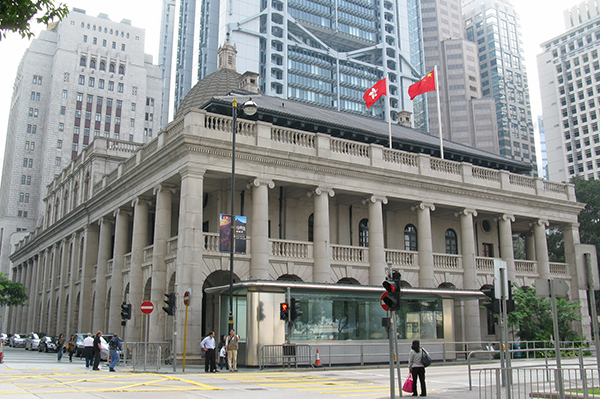I was there on that soggy, rain-soaked night twenty-two years ago, squeezed into a hotel room someone had rented to watch the fireworks display over Hong Kong’s harbour. It wasn’t only torrential rain that dampened spirits as the ‘festivities’ surrounding the UK’s handover of Hong Kong to the People’s Republic of China fizzled along. As the royal yacht, Britannia, was being readied for the last governor and his tearful family, the flag-raising ceremony took place indoors, with a sceptical Prince Charles representing the British Crown, and the ‘butcher’ of Tiananmen himself, Premier Li Peng, looking on. Down came the Union Jack and the Hong Kong flag — a British Blue Ensign sporting the Hong Kong coat of arms — and up went the five-starred red flag of the communist People’s Republic of China (PRC) alongside the flag of the new Special Administrative Region of Hong Kong, featuring a white bauhinia on a red background. Participants in the current protests on the streets of Hong Kong have replaced the red background with a black one, creating a flag that mourns the gradual extinction of local freedoms and way of life.

Ostensibly, these protests started as a movement of resistance against an extradition law that would allow Hong Kong courts to hand over suspects of criminal behaviour to the mainland Chinese justice system. However, the ideological objectives of the movement have since expanded into a much wider movement for the survival of Hong Kong in the face of the PRC’s encroaching power, as well as the steady erosion of the freedoms that were enshrined in the UK–China agreement. This treaty – which led to the passing of sovereignty from one colonial power to another on 1 July 1997 – was always an ignominious one for the citizens of Hong Kong. Rather than being given the independence that so many previous colonies had received in similar ceremonies during the second half of the twentieth century, here an entire population was simply ‘handed over’ to a regime that had slaughtered its own young people on Tiananmen Square a mere eight years prior.
The efforts of the last governor, Chris Patten, to devolve power were too little too late. The real harm had been done back in 1983, when the PRC’s supreme leader, Deng Xiaoping, had refused the UK Prime Minister Margaret Thatcher’s attempts to extend Britain’s lease on Hong Kong; most of Hong Kong’s land mass was leased to the UK in 1898 for 99-years. Faced with a lease due to expire in 1997, Thatcher ceded to his ‘one country, two systems’ proposal to allow Hong Kong a further 50 years of autonomy. This resulted in an agreement with no teeth. Britain was meant to guarantee its spirit and its letter, but even the recent, timid remarks made by the UK’s current Foreign Minister and candidate for the UK’s premiership, Jeremy Hunt, have been met with accusations from Beijing’s state-controlled media of interfering with China’s domestic affairs.
The ‘handover’ — what Prince Charles who witnessed it first hand described as the ‘Great Chinese Takeaway’ — is known in Chinese as the huigui or ‘return’. For China, this represented the end of over 150 years of humiliation at the hands of the British that had started with the mid-nineteenth-century Opium Wars. But how can you ‘return’ something that never existed? And how in the late twentieth century could a whole population be handed over like chattel? When the Manchu authorities – who were defeated in the first Opium War – gave up Hong Kong Island in perpetuity to the British crown, it was ‘barren rock’ with a scant population comprised mainly of fishermen. But by 1997, it was an ultra-modern, capitalist society with its own culture and language, and a population of seven million, most belonging to families who had fled mainland China over the previous 50 years.
When the 1842 Treaty of Nanking was signed, China did not exist – except in the eyes of the West. As I explain in my recent book China Imagined, not only did China, or Zhongguo in Chinese, not exist on any map as a nation-state, it did not even correspond to a national consciousness. ‘China’ was imagined by its elite, having been created largely from the country’s resistance to the Manchu Qing dynasty rulers, and the outrage and humiliation of being semi-colonised by foreign devils – the British. In the official history books, Hong Kong looms large in that story. Its ‘return’ was highly symbolic.
But as the recent graffiti slogans on the walls of the former British colony make clear, ‘Hong Kong is not China’. While the physical territory could be transferred, how can the aspirations, culture, and spirit of a community be ‘handed over’?
Twenty-two years after that fateful rainy night, an incursion of protesters draped Hong Kong’s old colonial-era flag over the Legislative Council’s speaker’s podium and spray-painted the bauhinia insignia black on 1 July 2019. After only a single month, approximately two million people— almost a third of the adult population— have taken to the streets. A supposedly ‘docile’ population has rebelled. A generation that never knew British colonial rule has asserted itself, supported by an older population who know only too well from experience and observation what the Chinese communist authorities are capable of. What inspired the authorities to try and push through a contentious extradition law in the same month as the 30th anniversary of the Tiananmen Square Massacre? Disdain for the popular will? Such insensitivity merely helped to fuel this act of civil disobedience. Of course, the conditions for this were already ripe. After all, what do Hongkongers have to lose? A certainty looms over them: that sooner or later Hong Kong will be absorbed into China entirely – its autonomous status expires in 2046. Their only real hope is that the people of China themselves will wake from their oppressive slumber first.